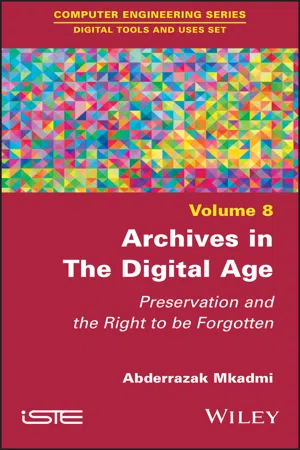
- English
- ePUB (mobile friendly)
- Available on iOS & Android
About this book
Archiving has become an increasingly complex process. The challenge is no longer how to store the data but how to store it intelligently, in order to exploit it over time, while maintaining its integrity and authenticity.
Digital technologies bring about major transformations, not only in terms of the types of documents that are transferred to and stored in archives, in the behaviors and practices of the humanities and social sciences (digital humanities), but also in terms of the volume of data and the technological capacity for managing and preserving archives (Big Data).
Archives in The Digital Age focuses on the impact of these various digital transformations on archives, and examines how the right to memory and the information of future generations is confronted with the right to be forgotten; a digital prerogative that guarantees individuals their private lives and freedoms.
Frequently asked questions
- Essential is ideal for learners and professionals who enjoy exploring a wide range of subjects. Access the Essential Library with 800,000+ trusted titles and best-sellers across business, personal growth, and the humanities. Includes unlimited reading time and Standard Read Aloud voice.
- Complete: Perfect for advanced learners and researchers needing full, unrestricted access. Unlock 1.4M+ books across hundreds of subjects, including academic and specialized titles. The Complete Plan also includes advanced features like Premium Read Aloud and Research Assistant.
Please note we cannot support devices running on iOS 13 and Android 7 or earlier. Learn more about using the app.
Information
1
Digital Archives: Elements of Definition
1.1. Key concepts of digital archives
1.1.1. Archives
Archives are the documentary by-product of human activity retained for their long-term value. They are contemporary records created by individuals and organizations, as they go about their business and therefore provide a direct window on past events. They can come in a wide range of formats including written, photographic, moving image, sound, digital and analogue. Archives are held by public and private organizations and individuals around the world. [ICA 16]
1.1.2. Archive management
1.1.2.1. Conservation objects
1.1.2.2. Conservation objectives and utility
1.1.2.3. Shelf life
- – Current or active archives represent documents that are regularly used in day-to-day work and are generally used to manage ongoing business. They are kept in offices close to the users;
- – Intermediate or semi-active archives represent documents that no longer have an immediate and daily use, but which must be saved because of a possible reopening or legal prescriptions. Since the frequency of use is low, these archives can be moved to another location for consultation if necessary or entrusted to an archive service that manages access to them on demand;
- – Permanent or historical archives are those archives that are no longer useful for the conduct of administrative activity and which are of historical or patrimonial interest. These archives must be kept for an unlimited period of time. It should be remembered that a very large number of archives that are not intended to enter the active age must be disposed of after agreement from the archive service.
1.1.2.4. How to keep archives
- – the provenance of the collection, which consists of not mixing documents;
- – the order of the collection, which consists of keeping the documents according to the classification made by the original organization;
- – the integrity of the collection, which consists of not splitting a collection that has already been set-up.
1.1.3. Archival management tools
1.1.3.1. Inventory of documents
1.1.3.2. Directory of typical files
Table of contents
- Cover
- Table of Contents
- Title Page
- Copyright
- Preface
- Introduction
- 1 Digital Archives: Elements of Definition
- 2 Digital Archiving: Methods and Strategies
- 3 Archives in the Age of Digital Humanities
- 4 Digital Archiving and Big Data
- 5 Preservation of Archives versus the Right to be Forgotten
- Conclusion
- List of Acronyms
- References
- Index
- End User License Agreement